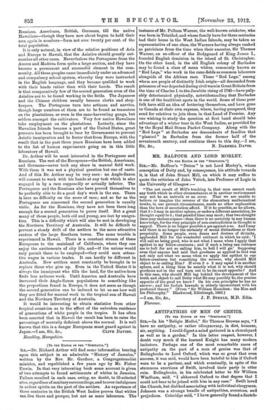MR. BALFOUR AND LORD MORLEY.
[To THE EDITOR 07 THE " SPECTATOR."] SIR,—Mr. Balfour's "Deism" is not Lord Morley's, whose conception of Deity and, by consequence, his attitude towards it, is that of John Stuart Mill, on which it may suffice to quote the criticism of John Veitch, late Professor of Logic in the University of Glasgow :- "The net result of Mill's teaching is, that man cannot reach any truth which in other circumstances or in another environment may not be an untruth or an error. That we are unable to believe or imagine the reverse of the elementary mathematical truths, in our present circumstances, needs no other explanation than the laws of association afford. If it be possible, as he allows, that 2 + 2 may in another sphere, or under a different association, be thought equal to 5 ; that parallel lines may meet ; that two straight lines may enclose a space—then there is no certainty in any human knowledge, for the very principle of non-contradiction in thought is sapped. There is no longer possible a yes against a no. And I may add there is no longer the certainty of moral distinctions or their perpetuity. Some people, even deans and doctors of divinity, applauded Mill for the wonderful outburst in which he said: will call no being good, who is not what I mean when I apply that epithet to my fellow-creatures ; and if such a being can sentence me to hell for not so calling him, to hell I will go.' Supposing even that anyone had said that goodness as applied to God was not only not what we mean when we apply the epithet to our fellow-creatures but something the reverse, why should Mill
object to so calling Him? If even 2 2 may equal 5 in another sphere, and a thing thus be exactly what it is not, why should goodness not in the end turn out to be its exact opposite ? And in this case, why should Mill lag behind the development of the truth and object to call Deity what He may possibly be, the precise opposite of the good we know ? On his own principles he has no answer ; and his foolish bravado is utterly inconsistent with his professed theory." (From " Sir William Hamilton : the Man and his Philosophy." Blackwood, Edinburgh, 1883.)
Florence.














































 Previous page
Previous page